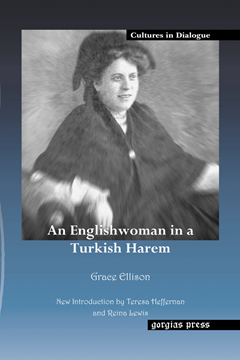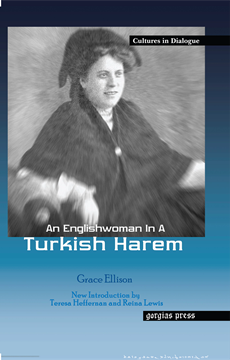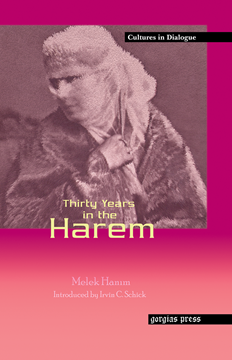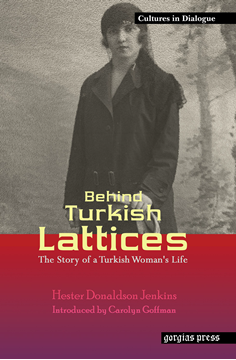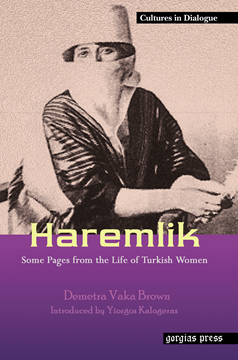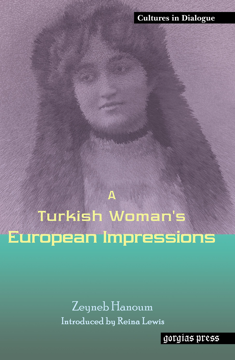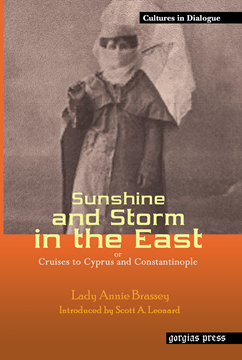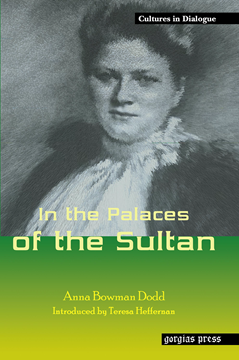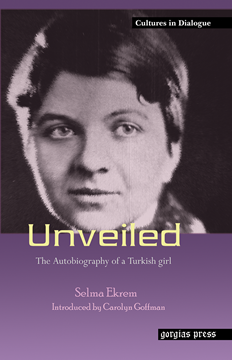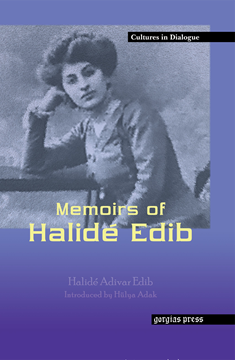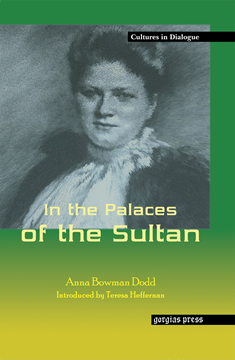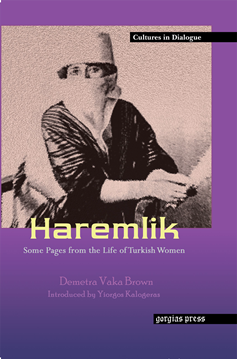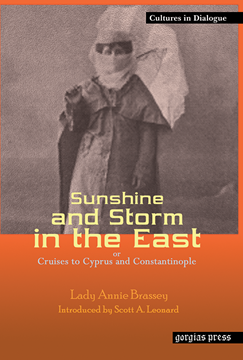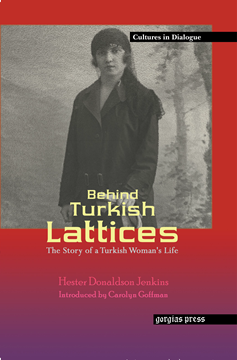Recently viewed products
Cultures in Dialogue: First Series
Reina Lewis
Cultures in Dialogue returns to print sources by women writers from the East and West. Series One considers the exchanges between Ottoman, British, and American women from the 1880s to the 1940s.
An Englishwoman in a Turkish Harem (paperback)
New Introduction by Teresa Heffernan and Reina Lewis
Series: Cultures in Dialogue: First Series 11
ISBN: 978-1-59333-309-6
Grace Ellison (d. 1935) actively encouraged dialogues between Turkish and British women at the outset of the twentieth century. Despite an impressive legacy, Ellison and her work have almost disappeared from the historical record; the republication of this 1915 work aims to address this neglect.
$99.00 (USD) $59.40 (USD)
An Englishwoman in a Turkish Harem
New Introduction by Teresa Heffernan and Reina Lewis
Series: Cultures in Dialogue: First Series 11
ISBN: 978-1-59333-211-2
Grace Ellison (d. 1935) actively encouraged dialogues between Turkish and British women at the outset of the twentieth century. Connected with progressive Ottoman elites discussing female and social emancipation, Ellison stayed in an Ottoman harem. Working as a respected journalist, she published articles about British-Turkish relations, Turkish nationalism, and the status of women across cultures. This book recounts Ellison’s stay with her friend Fâtima and features reports on motherhood, employment, polygamy, slavery, harem life, modernization, veiling, and prominent women writers. Despite an impressive legacy, Ellison and her work have almost disappeared from the historical record; the republication of this 1915 work aims to address this neglect.
$154.00 (USD) $92.40 (USD)
The Unveiled Ladies of Istanbul (Stamboul) (Paperback)
Series: Cultures in Dialogue: First Series 13
ISBN: 978-1-59333-217-4
The Unveiled Ladies of Istanbul (Stamboul) is a picturesque description of women's life in post-World War I Turkey during a period of social and political turmoil. Here Demetra Vaka (1877-1946), an expatriate of Ottoman Turkey, established American journalist and acquaintance of Prince Sabaheddin, returns to her native Istanbul after a 20-year absence. Describing women's lives in post-World War I Turkey, she reports on the successful project of female emancipation pursued by Mustafa Kemal as part of the nationalist agenda. Noting how much this project had benefited upper- and middle-class Turkish women, Vaka nonetheless regrets that the gradual emergence of the monocultural, modern Republic was bringing an end to the multiethnic character of the Ottoman State.
$116.00 (USD) $69.60 (USD)
Thirty Years in the Harem
New Introduction by Irvin C. Schick
By Melek Hanım
Series: Cultures in Dialogue: First Series 1
ISBN: 1-59333-208-4
Melek Hanım, an Ottoman woman of Greek, Armenian, and French heritage, accompanied her husband to various postings in Palestine and Serbia, and shared with him the frustrations of the arbitrary periodic dismissals that characterized late Ottoman politics. Her account of life in Turkey contains details of political intrigue, corruption and demonstrates the influence and mobility available to women in the official households of the Ottoman elite. Filled with maneuvers, murder, divorce, political machinations, and vengeance, Hanım's life was an attempt to gain access to property she viewed as legitimately her own. This book was written during her later exile in Paris.
$106.00 (USD) $63.60 (USD)
The Story of a Turkish Woman's Life (Paperback)
Series: Cultures in Dialogue: First Series 8
ISBN: 1-59333-307-2
Hester Donaldson Jenkins (1869-1941), a professor at the American College for Girls in Constantinople from 1900-1909, wrote enthusiastically about the Young Turks who seemed to promise new freedoms for Ottoman women. Jenkins uses her own observations of Constantinople, her students, and their families to construct an account of a "typical" Turkish Muslim woman's life cycle at this turning point in Ottoman history. She directs her comments toward childhood, education, marriage, polygamy, and divorce, in order to correct Western misapprehensions. In its confidence in the bright prospects of American influence and Ottoman reform, this book captures an optimistic moment in which social progress seemed to be thriving.
$94.00 (USD) $56.40 (USD)
Some Pages from the Life of Turkish Women (Paperback)
New Introduction by Yiorgos Kalogeras
Series: Cultures in Dialogue: First Series 2
ISBN: 1-59333-308-0
Born as a Greek Ottoman in Istanbul, Demetra Vaka Brown (1877-1946) moved to America where she became a journalist and novelist, revisiting Turkey to write several books about the twilight of the Ottoman Empire and the emergence of the Turkish Republic. She based this, her first book, on experiences from 1901, when modernization had made inroads into Ottoman domestic life and the harem was becoming a thing of the past. Her reflections on life in the harem suggest the conflicted nature of her allegiances: Vaka is nostalgic for the Ottoman life that was rapidly disappearing, but she also enjoys the freedoms of a professional American woman.
$106.00 (USD) $63.60 (USD)
A Turkish Woman's European Impressions
New Introduction by Reina Lewis
By Zeyneb Hanoum; Introduction by Reina Lewis
Series: Cultures in Dialogue: First Series 3
ISBN: 1-59333-306-4
Born into the Ottoman Muslim elite, Zeyneb Hanoum and her sister Melek Hanoum were given a Western-style education by their progressive father, who expected them subsequently to live the segregated lives of Ottoman ladies. Rebelling, the sisters collaborated with the French author Pierre Loti, hoping that harnessing European intellectual support would speed up Ottoman social reform. Fleeing Istanbul in 1906 for fear of imperial reprisals, the sisters traveled in disguise to Europe, hoping to find "freedom" in the West. With Zeyneb Hanum's letters punctuated by Grace Ellison's introduction, commentary, and footnotes, this book challenges Orientalist stereotypes and documents the vibrant engagement between Eastern and Western women at the fin de siècle.
$103.00 (USD) $61.80 (USD)
Sunshine and Storm in the East, or Cruises to Cyprus and Constantinople (Paperback)
Series: Cultures in Dialogue: First Series 7
ISBN: 1-59333-304-8
In this diary recording two voyages to Constantinople, Lady Annie Brassey demonstrates her keen eye for human interest and narrative detail. The modern reader will glimpse natural wonders and cultural distinctions of Portuagal, Spain, Moroco, Italy, Greece, and Turkey during the mid-1870s.
$161.00 (USD) $96.60 (USD)
Memoirs of Halide Edib
Series: Cultures in Dialogue: First Series 4
ISBN: 1-59333-305-6
A prominent novelist, social activist, journalist, and nationalist, Halide Edib Adivar (1882-1964) was one of Turkey's leading feminists in the Young Turk and early Republican period. Memoirs is the first book in her two volume English-language autobiography, published in 1926, while she and her second husband Dr. Adnan were in exile in London and Paris having fallen out of favor with Mustafa Kemal's one-party regime. Edib describes her childhood, her confrontation with her first husband's polygyny, her divorce, and her entry into political and literary writing. Edib's account of her private life provides a unique example of a woman's individual and personal struggle for emancipation and gender equality.
$165.00 (USD) $99.00 (USD)
In the Palaces of the Sultan (Paperback)
New Introduction by Teresa Heffernan
Series: Cultures in Dialogue: First Series 9
ISBN: 1-59333-303-X
As Anna Bowman Dodd (1855-1929), a New York travel writer and journalist, journeyed to Istanbul with the American Ambassador to France she embarked on a detailed account of the city and its people. Interested in documenting the changes in Turkey brought about by the "embrace" of modernity and progress, she considers Turkish women's rights, harems and marriage, the management of the household, education, slavery, the Sultan's reign, and nationalist movements in the last days of the Ottoman Empire. She caters to the American market for Orientalism but is also reflexive about its employment, both invoking and undercutting stereotypes as she addresses the "Eastern Question."
$166.00 (USD) $99.60 (USD)
Unveiled
New Introduction by Carolyn Goffman
By Selma Ekrem
Series: Cultures in Dialogue: First Series 5
ISBN: 1-59333-209-2
Selma Ekrem grew up among the progressive Ottoman Muslim elite. Ekrem benefited from having an unconventional mother, who did not insist on her daughter's veiling. The book covers the family's sojourns outside Istanbul when her father was governor in Jerusalem during the 1908 Young Turk revolution and then governor of the Greek Archipelago Islands, where the whole family was held captive when their island was taken by the Greeks during the Balkan Wars. Returning to Istanbul just as World War I broke out, Ekrem attended the American College for Girls. Frustrated at the restrictions of Turkish female life, Ekrem traveled to America and countered prevalent stereotypes by lecturing on Turkey.
$106.00 (USD) $63.60 (USD)
The Unveiled Ladies of Istanbul (Stamboul) (Hardback)
New Introduction by Yiorgos Kalogeras
Series: Cultures in Dialogue: First Series 13
ISBN: 1-59333-216-5
The Unveiled Ladies of Istanbul (Stamboul) is a picturesque description of women's life in post-World War I Turkey during a period of social and political turmoil. Here Demetra Vaka (1877-1946), an expatriate of Ottoman Turkey, established American journalist and acquaintance of Prince Sabaheddin, returns to her native Istanbul after a 20-year absence. Describing women's lives in post-World War I Turkey, she reports on the successful project of female emancipation pursued by Mustafa Kemal as part of the nationalist agenda. Noting how much this project had benefited upper- and middle-class Turkish women, Vaka nonetheless regrets that the gradual emergence of the monocultural, modern Republic was bringing an end to the multiethnic character of the Ottoman State.
$171.00 (USD) $102.60 (USD)
A Turkish Woman's European Impressions
New Introduction by Reina Lewis
Series: Cultures in Dialogue: First Series 3
ISBN: 1-59333-207-6
Born into the Ottoman Muslim elite, Zeyneb Hanoum and her sister Melek Hanoum were given a Western-style education by their progressive father, who expected them subsequently to live the segregated lives of Ottoman ladies. Rebelling, the sisters collaborated with the French author Pierre Loti, hoping that harnessing European intellectual support would speed up Ottoman social reform. Fleeing Istanbul in 1906 for fear of imperial reprisals, the sisters traveled in disguise to Europe, hoping to find "freedom" in the West. With Zeyneb Hanum's letters punctuated by Grace Ellison's introduction, commentary, and footnotes, this book challenges Orientalist stereotypes and documents the vibrant engagement between Eastern and Western women at the fin de siècle.
$158.00 (USD) $94.80 (USD)
Memoirs of Halide Edib
New Introduction by Hulya Adak
Series: Cultures in Dialogue: First Series 4
ISBN: 1-59333-206-8
A prominent novelist, social activist, journalist, and nationalist, Halide Edib Adivar (1882-1964) was one of Turkey's leading feminists in the Young Turk and early Republican period. Memoirs is the first book in her two volume English-language autobiography, published in 1926, while she and her second husband Dr. Adnan were in exile in London and Paris having fallen out of favor with Mustafa Kemal's one-party regime. Edib describes her childhood, her confrontation with her first husband's polygyny, her divorce, and her entry into political and literary writing. Edib's account of her private life provides a unique example of a woman's individual and personal struggle for emancipation and gender equality.
$220.00 (USD) $132.00 (USD)
In the Palaces of the Sultan (Hardback)
New Introduction by Teresa Heffernan
Series: Cultures in Dialogue: First Series 9
ISBN: 1-59333-204-1
As Anna Bowman Dodd (1855-1929), a New York travel writer and journalist, journeyed to Istanbul with the American Ambassador to France she embarked on a detailed account of the city and its people. Interested in documenting the changes in Turkey brought about by the "embrace" of modernity and progress, she considers Turkish women's rights, harems and marriage, the management of the household, education, slavery, the Sultan's reign, and nationalist movements in the last days of the Ottoman Empire. She caters to the American market for Orientalism but is also reflexive about its employment, both invoking and undercutting stereotypes as she addresses the "Eastern Question."
$221.00 (USD) $132.60 (USD)
Some Pages from the Life of Turkish Women (Hardback)
New Introduction by Yiorgos Kalogeras
Series: Cultures in Dialogue: First Series 2
ISBN: 1-59333-203-3
Born as a Greek Ottoman in Istanbul, Demetra Vaka Brown (1877-1946) moved to America where she became a journalist and novelist, revisiting Turkey to write several books about the twilight of the Ottoman Empire and the emergence of the Turkish Republic. She based this, her first book, on experiences from 1901, when modernization had made inroads into Ottoman domestic life and the harem was becoming a thing of the past. Her reflections on life in the harem suggest the conflicted nature of her allegiances: Vaka is nostalgic for the Ottoman life that was rapidly disappearing, but she also enjoys the freedoms of a professional American woman.
$161.00 (USD) $96.60 (USD)
Sunshine and Storm in the East, or Cruises to Cyprus and Constantinople (Hardback)
New Introduction by Scott A. Leonard
Series: Cultures in Dialogue: First Series 7
ISBN: 1-59333-202-5
Lady Annie Brassey (1839-1887) possess a keen eye for human interest and narrative detail that propelled her to international fame as a travel writer. This book presents a daily diary of two voyages to Constantinople aboard her family yacht in the mid 1870s. Here, the modern reader may glimpse the natural wonders, cultural distinctions, and political circumstances of such countries as Portugal, Spain, Morocco, Italy, Greece, and Turkey during that time period. Readers will also find an excellent example of the nineteenth-century European fascination with the "Orient."
$217.00 (USD) $130.20 (USD)
The Story of a Turkish Woman's Life (Hardback)
New Introduction by Carolyn Goffman
Series: Cultures in Dialogue: First Series 8
ISBN: 1-59333-105-3
Hester Donaldson Jenkins (1869-1941), a professor at the American College for Girls in Constantinople from 1900-1909, wrote enthusiastically about the Young Turks who seemed to promise new freedoms for Ottoman women. Jenkins uses her own observations of Constantinople, her students, and their families to construct an account of a "typical" Turkish Muslim woman's life cycle at this turning point in Ottoman history. She directs her comments toward childhood, education, marriage, polygamy, and divorce, in order to correct Western misapprehensions. In its confidence in the bright prospects of American influence and Ottoman reform, this book captures an optimistic moment in which social progress seemed to be thriving.
$149.00 (USD) $89.40 (USD)


